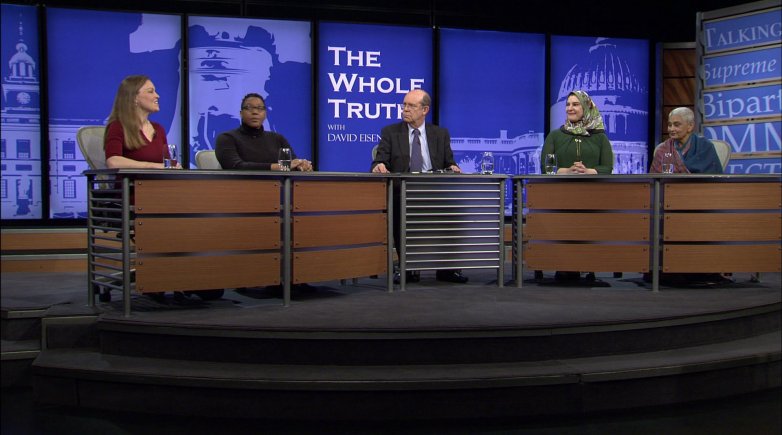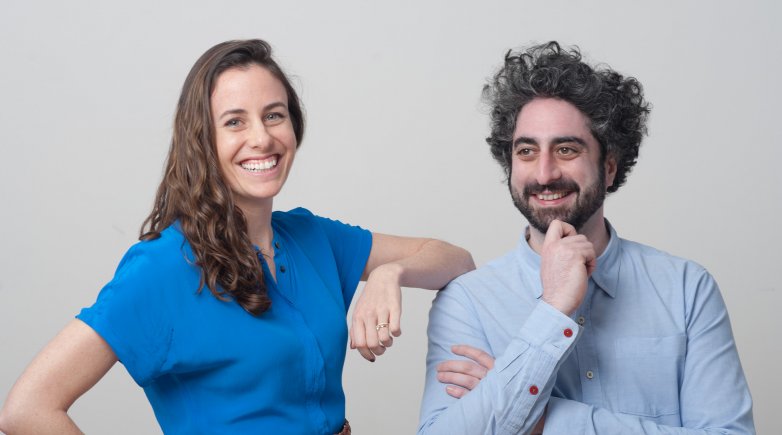The art of civil discourse
Historian David Eisenhower '66 makes room on TV for respectful debate of today's issues.
"The Whole Truth with David Eisenhower" debuted in 2016. It airs on more than 140 public stations nationwide.
David Eisenhower '66 is not ready to give up on civil discourse, scarce as it may be in the public realm of today’s America. As host of the public television show “The Whole Truth with David Eisenhower,” he brings the perspective of a historian and the diplomacy of a seasoned political observer to a discussion of the pressing issues of our times. The program explicitly takes a different approach by avoiding punditry and argument, focusing instead on a nuanced examination of the question at hand.
Eisenhower describes the show’s objective as understanding a problem rather than reaching a resolution. “The most important precondition for civil discourse is an agreement that an issue or problem exists,” he says. “We have serious questions we have to address as a society. This is not so easy to accept. We establish this on the show. If we can agree we have problems, we can start there.”
Launched in 2016 by the World Affairs Council of Philadelphia, a nonprofit, educational organization dedicated to creating an informed citizenry, the program takes aim at the pervasive notion that, as a promo puts it, “the American marketplace of ideas has become dysfunctional.” Originating at WHYY-TV in Philadelphia, “The Whole Truth with David Eisenhower” is currently launching its third season. It is distributed by American Public Television and shown on more than 140 stations nationwide.
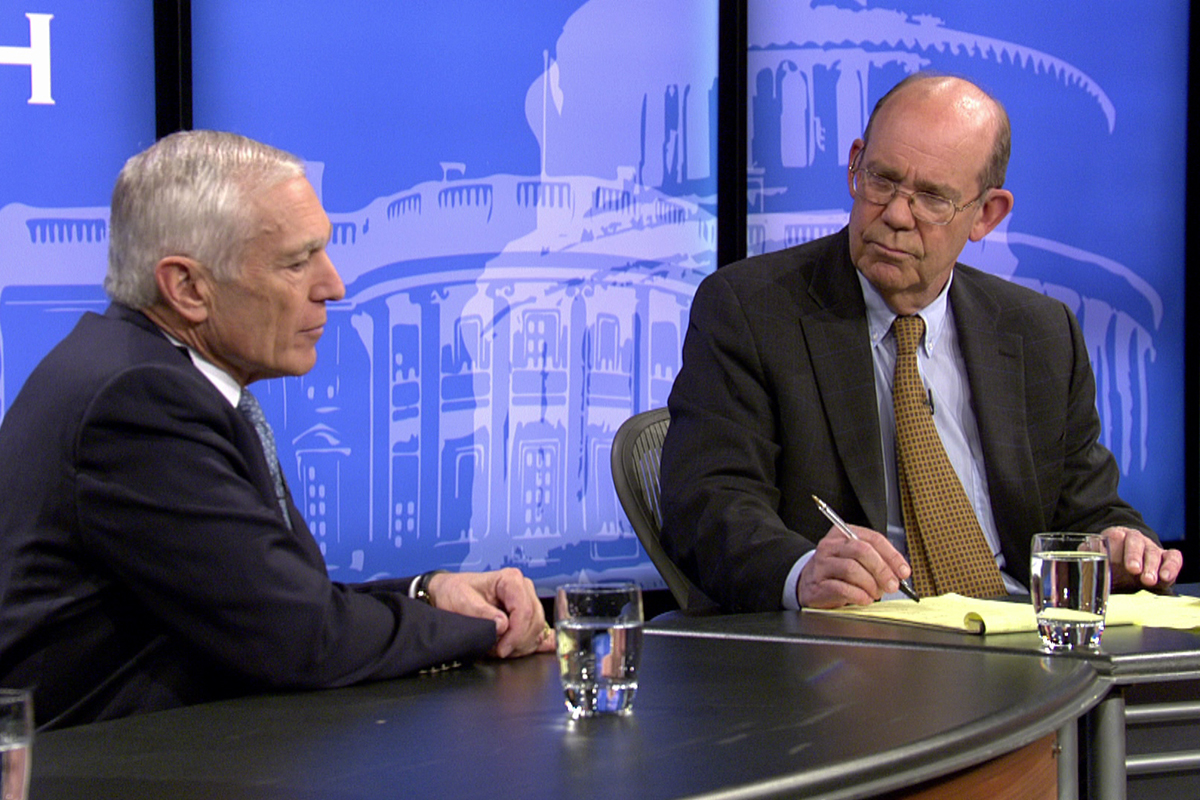
Each half-hour episode brings together several guests who are experts in their fields to define and explore a given issue. In the first two seasons, shows have been devoted to such topics as income inequality, feminism in the age of Trump, the war in Iraq, poverty in the shadow of plenty, demographics and immigration, 21st-century Islam, and the state of American democracy. Guests have included Gen. Wesley Clark; former Sen. Tom Daschle, D-S.D.; former Congressman Tom Davis, R-Va.; MSNBC’s Chris Matthews and Joan Walsh; Bloomberg’s Al Hunt; and cable news host and commentator Greta van Susteren.
In designing the show, co-executive producers Craig Snyder and Brian O’Reilly have made a number of careful choices. Guests represent a range of political backgrounds and areas of expertise, and are asked to work toward a common understanding of the problem under discussion. The production team sees to this both in the preparation of participants prior to taping and in Eisenhower’s evenhanded direction of the discussion. The result is a refreshingly thoughtful look at the challenges facing our country and the world. No shouting, no talking over each other; just respectful debate and discussion.
The guests spend 45 minutes together before taping begins. “This is one dynamic that makes a difference,” Eisenhower says. “Our guests are not in a remote studio. We ask people not to comment on events that are happening currently, but to look at the topic in a broader perspective. This puts people in a different frame of mind.”
These factors are key to creating the show’s civil tone, Eisenhower believes. Each segment begins with an introduction from Eisenhower, in which he explains the program’s goals and outlines the topic of the day. The show concludes with a wrap-up from Eisenhower that gets at “the whole truth” of the subject.
Snyder, now president of the World Affairs Council, was former chief of staff for the late Sen. Arlen Specter of Pennsylvania, and was intrigued by the challenge of bringing a truly nonpartisan discussion of the issues to television. He partnered with Brian O’Reilly, a seasoned television professional, and worked on producing a pilot for the show with Maryland Public Television in 2012 with Specter as host, but the project was put on hold when Specter became ill. When Snyder was appointed president of the World Affairs Council, they resurrected the idea and reached out to Eisenhower, someone they felt would be ideal for the role of host.
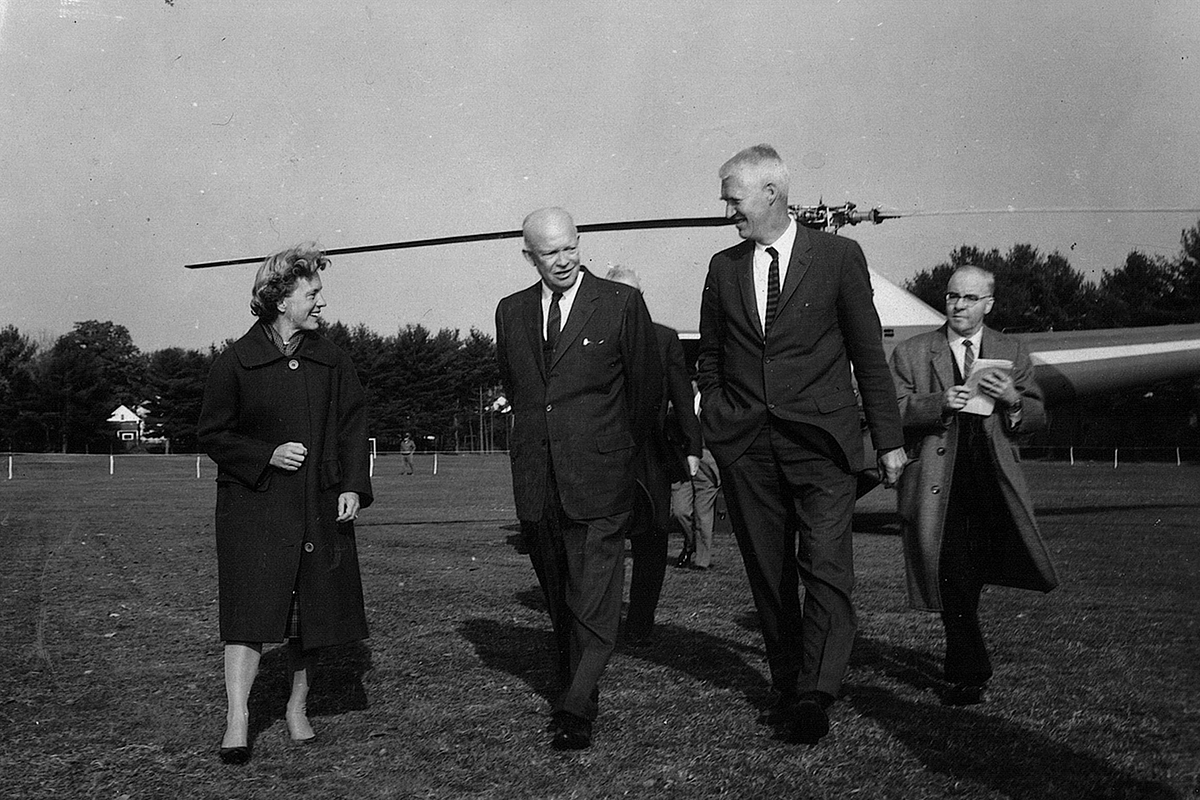
The grandson of President Dwight D. Eisenhower, David Eisenhower is an author, historian and academic. He has had a front-row seat to history in two White House administrations, as a boy during his grandfather’s presidency and as a son-in-law during the Nixon years. He and Julie Nixon were married 1968, a month before her father took office. These twin experiences have given him an enduring interest in the institution and history of the presidency.
After graduating from Phillips Exeter, Eisenhower attended Amherst College, served in the Naval Reserve, and completed his J.D. at George Washington University Law School. Today he is director of the Institute for Public Service at the Annenberg Public Policy Center. He also serves as a senior research fellow at the Annenberg School for Communication at the University of Pennsylvania and is a fellow in the International Relations Department at the university.
Eisenhower’s book "Eisenhower at War: 1943-1945" takes an in-depth look at his grandfather’s leadership as supreme allied commander in Europe. The book was a finalist for the Pulitzer Prize in history in 1986 and named by Time magazine as one of the five best nonfiction books of the year. More recently, Eisenhower teamed up with Julie to write "Going Home to Glory: A Memoir of Life with Dwight D. Eisenhower, 1961-1969." The memoir chronicles the years after Dwight Eisenhower’s presidency, when he came to live on the family farm in Gettysburg where David and his family lived, during David’s adolescence. In a review, the Los Angeles Times describes "Going Home to Glory" as a “nostalgic tribute [that] could be seen as an implicit rebuke to those who reject [President Eisenhower’s] legacy of bipartisanship and moderation.”
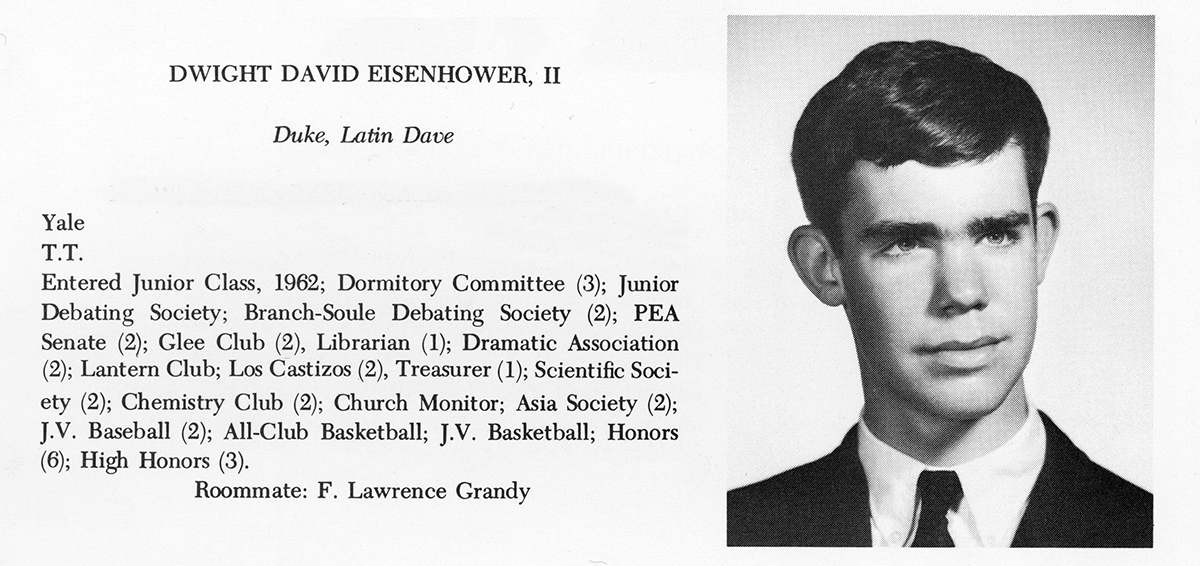
Eisenhower is currently completing a collection of essays on the 1950s and on significant decision points in Dwight Eisenhower’s presidency, under contract with Simon & Schuster. He is also continuing work on the larger project begun with "Eisenhower at War" of documenting a complete narrative of the Eisenhower presidency. This, he notes, will probably occupy him for the rest of his life.
Of the many years he has devoted to writing about his grandfather, Eisenhower says, “My father and grandfather experienced his career together. They were very close. I was outside it. This made me very curious about my grandfather and his times.”
Eisenhower recalls his grandfather as a man “of greatness” who both inspired and challenged him. In "Going Home to Glory," he quotes from a letter Ike sent him when he was a prep at Exeter. Ike advised him to use shoe trees in his golf shoes so they would look decent, then ended the letter with a metaphor: “Well, if you’re learning to box, keep your left eye almost out in front so that your jab would have the power of the shoulder behind it; the right fist close, the glove close to your chin and your weight so evenly distributed you can move rapidly in any direction.”
